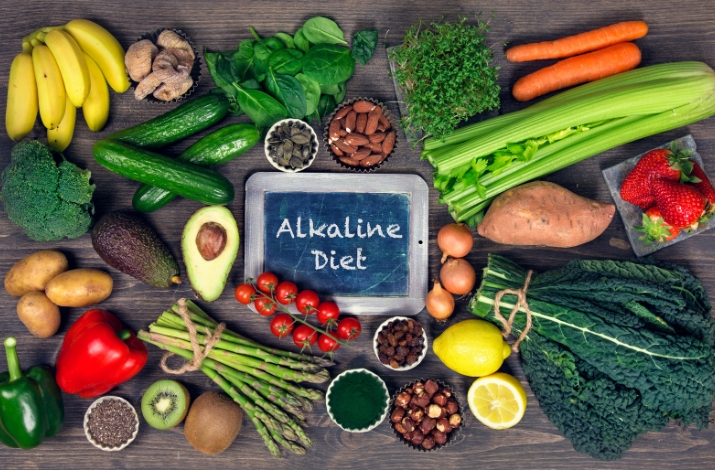What is the Alkaline Diet and is it safe?

Several years ago, a new way of eating called the “Alkaline Diet” took the celebrity world by storm, with stars like Victoria Beckham and Gwyneth Paltrow raving about it. The premise of the diet (also known as the alkaline ash diet or alkaline acid diet) is that the pH of the foods we eat affects our health. Its practitioners suggest that because of the slight alkalinity of blood, acidic diets are at the root of major health disorders.
For those who’ve forgotten 7th grade science, alkaline is the term for those liquids above 7 on the pH scale. The pH scale, itself, measures the potential hydrogen found in liquids. The scale ranges from 0-14, with 7 being neutral, anything above 7 being basic, and anything below being acidic.
The Alkaline diet promotes eating foods that don’t produce acid when they’re digested. This includes most fruits and vegetables, nuts, legumes, oats, and seeds.
Foods that break down to a neutral pH include starches and sugars, most oils, butter, soy, and cream. The diet limits these.
Foods that create acid when digested include chicken, red meat, dairy, fish, eggs, lentils, most grains, tea, coffee, and alcohol. The diet avoids these.
This way of eating emphasizes mostly vegan foods, and indeed, many people who consider themselves “Alkalarian” may be vegans. However, because some advocates allow moderately acidic foods, like goat cheese and certain kinds of fish, to make up no more than 20% of their diet, not all Alkalarians will be vegans (and not all vegans eat alkaline foods).
There’s no question that eschewing the standard Western diet of sugar and starch in favor of veggies, seeds, and legumes can lead to health improvements if carefully done. As a result, people eating an alkaline diet may see improved health. But what about claims that the acidity or alkalinity of our food can affect our health?
The evidence doesn’t support the conclusion [1].
The pH of stomach acid is between 1.5 and 3.5. When we eat foods that are more acidic, the pH of our waste–including saliva and urine–shows the effects, not our blood. As previously mentioned, the pH of blood is very slightly basic and keeps to a tightly controlled range of 7.35-7.45 [2]. This pH is essential for the proper functioning of the body’s biological processes, and multiple systems in the body work to ensure it stays within that range [3]. While some studies show that cancer cells grow more in acidic environments, those studies are done in cancer cells in a petri dish, not on cells in a living body, which are affected by far more elements than simply acidity. Multiple studies have confirmed that the pH of food cannot affect the pH of blood, the premise that the Alkaline Diet rests on [4].
That isn’t to say there are no health merits to the diet. Let’s review the pros and cons.
Pros
The Alkaline Diet promotes eating unprocessed, real food. Unprocessed foods, or whole foods, retain their nutrients without added sugars or chemical additives. Diets that consist primarily of whole foods can lessen inflammation, which is known to contribute to declining health [5].
Because whole foods, like those emphasized in an alkaline diet, don’t have added sugar and are often high in fiber, they are considered low glycemic. “Low glycemic” refers to where foods rank on the glycemic index, a system that ranks the effect of carbohydrates on blood sugar.
Whole foods don’t have as much impact on blood sugar as most processed foods do. When you eat food that spikes your blood sugar, it causes your pancreas to release insulin. Insulin tells the body to use some of that sugar as immediate energy and to store the rest as fat. The danger of eating foods that require more and more insulin is that they can lead to insulin resistance, a major driver of disease [6]. In general, whole foods require less insulin than processed foods, meaning that your body can use them for fuel without the need to store as much fat.
While the alkaline diet’s unprocessed way of eating has its pluses, though, the minuses should give anyone pause.
Cons
Lack of protein – The biggest concern about an alkaline diet is the lack of protein options, particularly animal proteins. There are nine essential amino acids required by the body that can only come from diet. Animal proteins are considered “complete” proteins, as they contain all nine of these essential amino acids. Most plant proteins, however, are not complete and either lack certain amino acids altogether or lack the necessary amount of one or more. As the Alkaline diet restricts virtually all animal proteins (except ocean fish sparingly, for those who allow wiggle room), and because even many plant proteins are considered acid-forming, protein deficiency is a serious concern for those eating an Alkaline diet. Amino acids are not stored by the body, so all essential amino acids must be consistently acquired through diet. When incomplete proteins are eaten for too long, even the lack of a single amino acid will cause the body to start breaking down muscle tissue to get the amino acid it lacks.
As a result, people who eat a strict alkaline diet are at risk of numerous complications that come from not getting enough protein, including muscle aches, loss of muscle mass, edema, weakness, fatigue, increased susceptibility to illness, decreased ability to heal, decreased bone density, stunted growth, hair loss, and more [7].
Nutrient deprivation – The restrictions that come with the Alkaline diet make nutrient deprivation a real risk. Calcium deficiency is a serious concern for those on an Alkaline diet, as dairy isn’t allowed and few plant sources provide sufficient calcium to make up for it. Anemia is another potential concern [8].
Other concerns – Alkaline water is frequently touted as a healthier “cancer-fighting” alternative to water, but studies have shown that, not only does it have no impact on cancer, but it can inhibit gastric secretion, reduce gallbladder emptying, and even lead to toxic reactions [9,10].
In extreme cases, some people have had fatal reactions to their attempts to cure diseases through an alkaline diet [11].
Takeaway
Eating a well-balanced, low-glycemic diet can lead to improved health, especially when compared to a standard Western diet. However, this has nothing to do with the pH of the food consumed. The acidity or alkalinity of food cannot impact the pH of blood or improve your health. A diet that attempts to manipulate the alkalinity of the body may put you at serious risk for nutritional deficiency and other potentially toxic complications.
If you want to get healthy and lose weight, stick with diets that also emphasize real, unprocessed foods. Consider the ketogenic diet, low carb diet, Mediterranean diet, paleo diet, or carnivore diet, all which have the history and evidence to back up their claims.
References
- https://www.healthline.com/nutrition/the-alkaline-diet-myth
- https://www.ncbi.nlm.nih.gov/books/NBK507807/#_article-17093_s1_
- https://www.ncbi.nlm.nih.gov/pmc/articles/PMC3195546/
- https://www.mdanderson.org/publications/focused-on-health/the-alkaline-diet–what-you-need-to-know.h18-1592202.html
- https://www.ahajournals.org/doi/full/10.1161/01.cir.0000052939.59093.45
- https://www.aafp.org/pubs/afp/issues/2001/0315/p1159.html
- https://www.health.com/nutrition/signs-not-eating-enough-protein
- https://health.clevelandclinic.org/alkaline-diet/
- https://bmjopen.bmj.com/content/6/6/e010438
- https://www.sciencedirect.com/science/article/abs/pii/S1438463915000085?via%3Dihub
- https://www.cbs8.com/article/news/investigations/new-charges-against-ph-miracle-doctor/509-5ed6187c-544a-4f06-aeaf-d8e33af21eb1
This article is for informational and educational purposes only. It is not, nor is it intended to be substitute for professional medical advice, diagnosis, or treatment and should never be relied upon for specific medical advice.

















